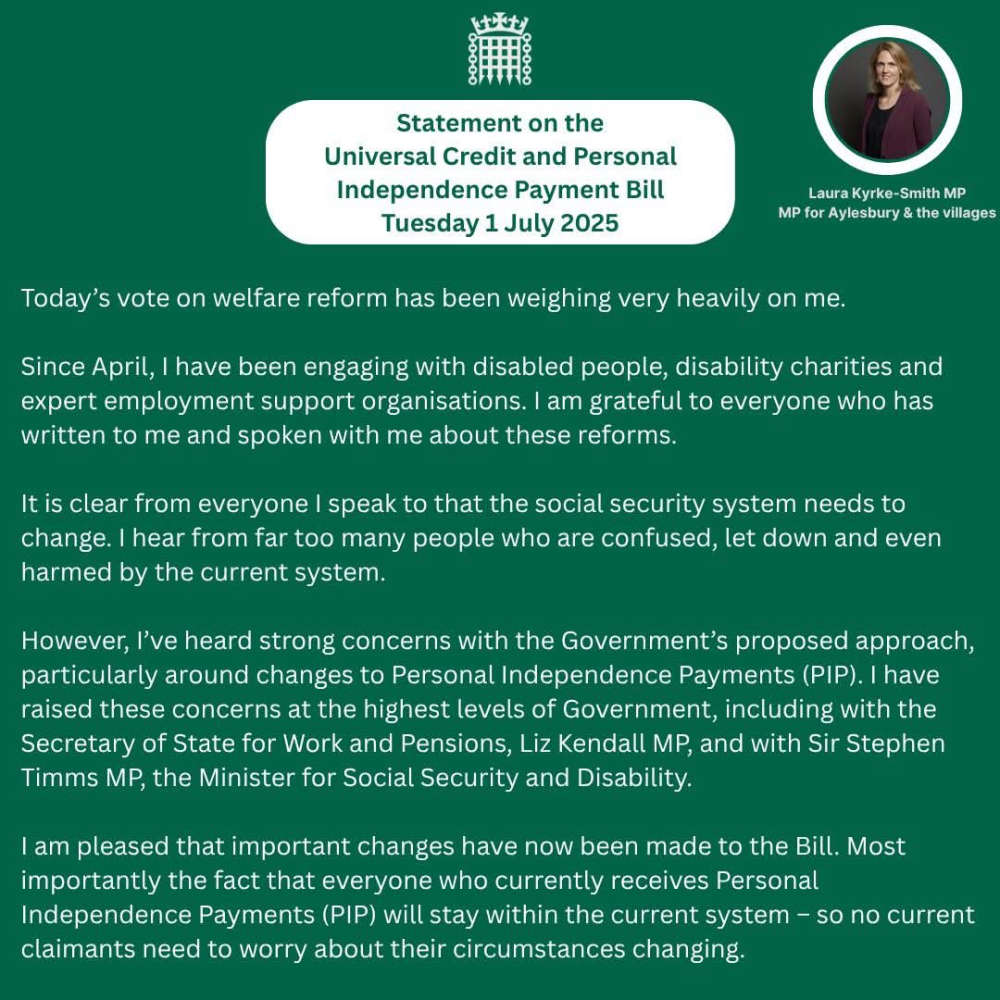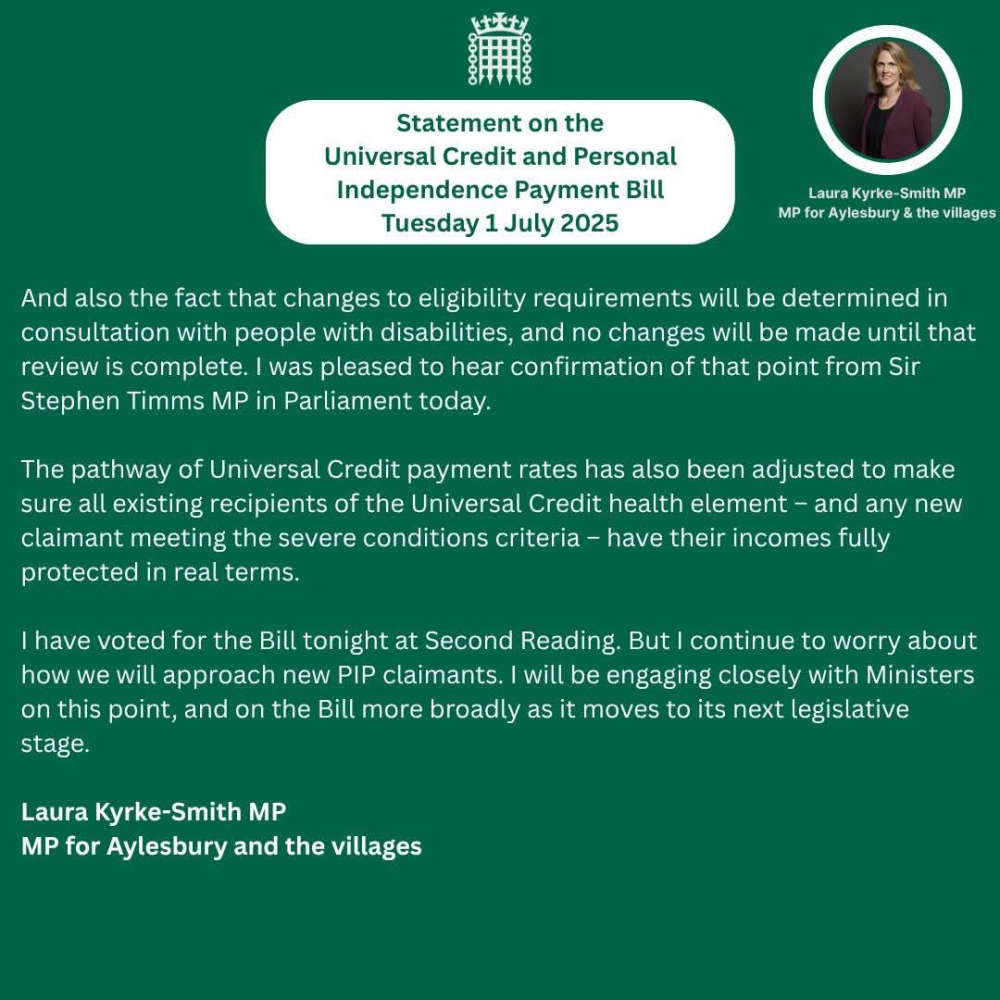
Laura Kyrke-Smith has issued a statement following her vote on the Universal Credit and Personal Independence Payment (PIP) Bill in Parliament on Tuesday (01/07).
In her statement, the Labour MP outlined the heavy decision she faced and provided clarity on her position regarding the controversial welfare reforms.
Weighing the Decision
She described the vote as a difficult and weighty one, reflecting on the months of conversations she had with people with disabilities, disability charities, and expert employment support organisations. "Since April, I have been engaging with people with disabilities, disability charities, and expert employment support organisations," she explained. She emphasized that the feedback from those directly impacted had played a crucial role in shaping her views. "I am grateful to everyone who has written to me and spoken with me about these reforms," she added.
While Kyrke-Smith Smith acknowledged the need for reform within the social security system, she also raised concerns. She pointed out that far too many people are "confused, let down, and even harmed" by the current system. For Aylesbury's MP, reform was necessary, but the government's approach to it raised significant red flags—especially concerning changes to Personal Independence Payments.
Concerns Over Personal Independence Payments
One of her primary concerns was the government's proposed changes to PIP, which she believed could negatively affect future claimants. She raised these concerns with key government officials, including Liz Kendall, the Secretary of State for Work and Pensions, and Sir Stephen Timms, the Minister for Social Security and Disability.
"I've heard strong concerns about how the Government plans to change Personal Independence Payments, and I've raised these issues at the highest levels of Government," Kyrke-Smith said. She stressed that any changes to eligibility for PIP should be approached with care and consultation with people with disabilities.
Important Changes to the Bill
In response to Kyrke-Smith's concerns and those from other MPs, the government made significant revisions to the bill. "I'm pleased that important changes have now been made to the Bill," she said. The most significant of these changes is that current Personal Independence Payment claimants will not be affected by the reforms. "No current claimants need to worry about their circumstances changing," Aylesbury's MP confirmed, ensuring that those already receiving PIP will stay within the existing system.
Additionally, eligibility requirements for PIP will be reviewed in consultation with people with disabilities. "No changes will be made until that review is complete," Kyrke-Smith assured. She welcomed confirmation of this point from Sir Stephen Timms during a debate in Parliament.
Protecting Universal Credit Recipients
She also welcomed adjustments to the Universal Credit payment rates, ensuring that those receiving the Universal Credit health element are fully protected. "I'm pleased that existing recipients of the Universal Credit health element – and any new claimants meeting severe conditions criteria – will have their incomes fully protected in real terms".
Moving Forward with Caution
Although Kyrke-Smith voted in favour of the bill on Tuesday at its second reading, she remains cautious about the future. While she believes that the government has addressed some of the immediate concerns, she is still worried about how the reforms will affect new PIP claimants.
"I will continue to engage closely with Ministers on this issue and on the bill as a whole," she said, while adding she is committed to ensuring that future changes to the system are fair, transparent, and take the needs of people with disabilities into account.
Going forward
In her statement, Kyrke-Smith made it clear that while she has voted in favour of the bill for now, her work is far from finished. She will remain in close dialogue with government officials as the bill progresses through the next legislative stages, ensuring that the voices of people with disabilities are heard and that the reforms bring about meaningful, beneficial change.





 Football Club Marks One-Year Anniversary of Championing Men’s Mental Health
Football Club Marks One-Year Anniversary of Championing Men’s Mental Health
 Food waste recycling expanding to flats in the south of Buckinghamshire
Food waste recycling expanding to flats in the south of Buckinghamshire
 Bucks Olympians going for gold in Italy
Bucks Olympians going for gold in Italy
 Bucks charity launches overnight Hospice at Home service
Bucks charity launches overnight Hospice at Home service
 New double yellows for street
New double yellows for street
 Amnesty for blank guns now classed as illegal
Amnesty for blank guns now classed as illegal
 Aylesbury Arm of canal re-opened
Aylesbury Arm of canal re-opened
 Bucks community groups eligible to benefit from £200,000 seized from criminals
Bucks community groups eligible to benefit from £200,000 seized from criminals











